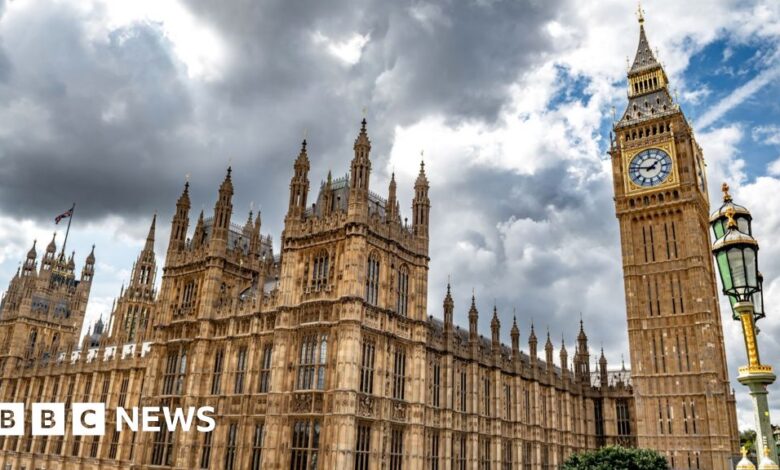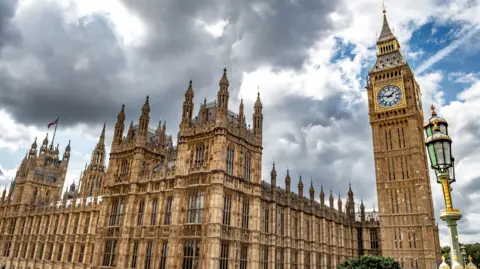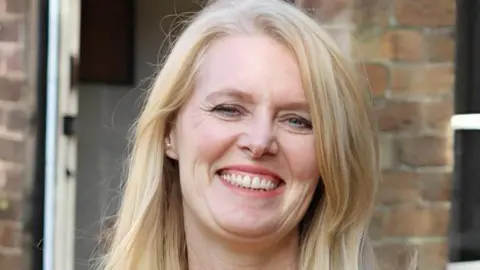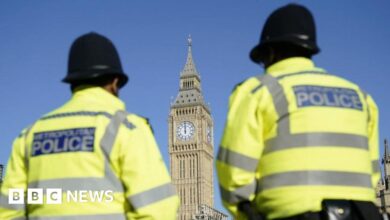MP calls for criminal record checks for parliamentarians

 Getty Images
Getty ImagesMPs and peers could be forced to submit to criminal record checks due to their level of access to young and vulnerable people, under proposals launched by a new MP.
Labour MP Jo White has suggested in-depth background checks made by the Disclosure and Barring Service (DBS) as part of inducting MPs into Parliament.
Candidates are banned from running to be MPs if they have been jailed for more than a year anywhere in the British Isles, or been convicted of corruption, but there is no requirement for DBS checks to be made.
The checks are required when applying for jobs with high-levels of access to vulnerable people – such as a teacher, social worker or GP.
White, the MP for Bassetlaw in Nottinghamshire, said the current system assumes MPs are “fit and proper” people, without requiring proof.
“The level of access you get as an MP is a bit like Jimmy Savile,” White told the BBC.
Savile’s work as an entertainer with the BBC and his charitable efforts gave him unsupervised entry to sensitive areas like hospital wards, schools and mortuaries, where he abused vulnerable people.
Since becoming an MP in July, White said she had found “most people will not stop you going into services in your constituency,” she added.
MPs regularly meet constituents as part of their job and often advocate for them if they are having problems accessing local services.
With this level of access “if an MP wants to wield power” it would be very easy because “lots of people are star struck”, she said.
“If you are predatory, that is how it happens,” she said.
What is a DBS check?
The checks let potential employers know if a candidate has a criminal record or is banned from working with children or vulnerable adults.
Some local authorities, like Hackney Councils, run DBS checks on elected officials. And DBS checks for elected councillors across the country are currently defined as “best practice” but are not mandatory.
The House of Lords Appointments Commission vets potential peers to “ensure the highest standards of propriety”.
But prospective candidates for Parliament can stand for election despite having a criminal record or appearing on the child barred list or adult barred list – unless they have served a prison term over 12 months, convicted of corruption or are the subject of bankruptcy restrictions.
Outside of this political parties are responsible for carrying out their own vetting to ensure they select the right candidates.
 Jo White
Jo WhiteWhite said adding DBS checks in Parliament would raise vetting standards since “parties will not risk putting a candidate forward without” checking their criminal history themselves.
A DBS check would also allow the public to make more informed choices with their elected representatives.
At the same time, the change would “make Parliament a safer place to work”, she said.
“There would be no DBS check if I wanted a 16-year-old to come work in my office on work experience – that makes me worried,” she said.
During the last parliament, staff complained to the BBC about a “predatory” culture in the House of Commons, following a string of allegations about bullying and sexual harassment.
A DBS would help potentially weed out abusive candidates, and prevent them working in close quarters with junior staff, White said.
Despite her concerns, White said her campaign was not driven by fear of a hidden abuser working as an MP.
The majority of MPs “are here for altruistic reasons”, she said.
Labour MP Jess Asato told the BBC she is supporting White’s campaign and hopes it sparks a “wider debate” around the “complex area” of getting the right MPs.
“I think there is a very clear revulsion at the idea that someone banned from working with children could hold public office,” she said.
Asato said this must be balanced with the right of reformed or wrongfully convicted individuals to stand for Parliament, and DBS checks would help provide the “transparency we need”.
Before becoming an MP, Asato worked as a campaigner for victims of domestic abuse and has praised the standards of behaviour she has seen in Parliament.
White’s campaign has gained quiet support across party lines.
An Early Day Motion – a call for a debate in the House of Commons for which no day has been fixed – tabled by White calling for DBS checks on MPs and peers has been backed by 14 MPs from Labour, Lib Dems as well as independents.
The motion was also signed by all four Green Party MPs, including co-leader Carla Denyer who called running DBS check on MPs “an absolute no brainer”.
Denyer voluntarily paid for her own enhanced DBS checks after needing them for volunteer roles before her time as an MP.
She described them as a “sensible protection to safeguard constituents”.
White has passed her proposals to the newly formed Modernisation Committee, which is carrying out a major review of Commons standards and working practices.
However, there are concerns about who would operate such a scheme, between political parties and Parliament itself, and how the information would be used.
The committee said it would not be commenting on submissions until it had time to fully consider all options.
But in October, Commons Leader Lucy Powell, who heads the committee, said there was “much to do” to repair the “tarnished” reputation of Parliament.
The committee is due to publish an initial report on the submissions in the new year.





